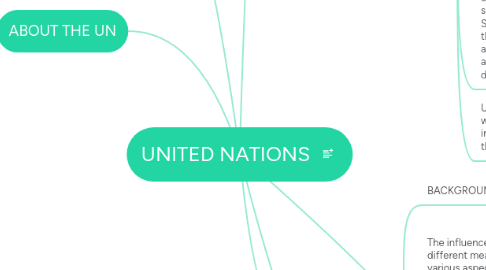UNITED NATIONS
por María Fernanda Aguilar Rivera


1. The UN was created in 1945 after WW2 precisely to prevent a tragedy such as the one humanity faced during the second world war. However, even after the creation of the United Nations humanity has faced genocides such as the Rwanda genocide(1994). Is the UN failing in its main purpose or reason to be? In Tower of Babble: How the United Nations Has Fueled Global Chaos a book published in 2004 by a former ambassador to the UN Dore Gold, he criticized the moral relativism of the organization.
2. ABOUT THE UN
2.1. International organization to promote international co-operation founded in 1945 after WW2.
2.2. It emerged as a replacement for the ineffective League of Nations
2.3. 193 Member States/ 2 Observer states
2.4. Main Organs
2.4.1. General Assembly
2.4.2. Security Council
2.4.3. ECOSOC
2.4.4. Trusteeship Council
2.4.5. International Court of Justice
2.4.6. Secretariat
2.5. UN system agencies
2.5.1. UNESCO
2.5.2. WHO
2.5.3. UNICEF
2.5.4. World Food Program
2.5.5. World Bank Group
2.6. Secretary General: Ban Ki-moon
3. REFERENCES
3.1. - About the UN | United Nations. (n.d.). http://www.un.org/en/about-un/index.html - Fasulo, Linda (2004). An Insider's Guide to the UN. Connecticut: Yale University Press. - Meisler, S. (1995). United Nations: the first fifty years. New York: Atlantic Monthly Press. - Müller, J. (2010). Reforming the United Nations: Reforming the United Nations: The Challenge of Working Together (1) (Vol. 1). Massachusetts: Brill | Nijhoff. - United Nations. (2016). https://en.wikipedia.org/wiki/United_Nations
4. Reforms are done in extraordinary situations, where there is a disagreement with the UN decision. They are commonly made by a Member Country rather than by the secretariat.
5. CRITICISM
5.1. BACKGROUND
5.1.1. The UN has been criticised for over-regulating global economy and interfering with issues considered subject to national sovereignty. (Müller, J.,2010).
5.2. The influence of different stakeholders with different means and interests toward reforms in various aspects. The UN should be neutral, create reforms based on general needs. The United States is more into Human Rights and Security while countries of the South aim towards economic interests.
5.3. VETO power, If one of those five (Russia, United States, China, U.K., France) countries objects even though there is a majority of countries towards certain action, the whole UN procedure or action towards a crisis will be shut down. This is not fair, of course a country will reject an action if it is harmful or does not benefit them, which is selfish. The UN must take action and provide a fair and critical solution towards the crisis.
6. POSSIBLE REFORMS
6.1. BACKGROUND
6.1.1. Through history the UN has been trying to adapt, throughout a series reforms which tried to cover all aspects of organizational life.
6.2. The UN must be neutral, and do not act because of a stakeholders influence. It must watch over all of the member countries equally. Analysing the situation and acting according to its criteria and not because of its preference towards a certain stakeholder or country.
6.3. The world is in constant change and evolution, the UN must do the same. Adapt to actual situations such as climate change with innovative and critical solutions taken by the UN.
6.4. A states position towards the UN should not affect their contribution or participation in it. Such as the case of the United States, when in 1980 8 American soldiers were murdered while serving in UN operations (Müller, J., 2010), because of this the US reduced its participation in peacekeeping operations and wanted to reduce its contribution to the UN budget, taking into account that the US is considered as a key stakeholder.
6.4.1. A states participation and compromise towards the UN must remain the same, situations such as the one mentioned should be resolved in a way in which neither the state nor the UN are affected.

